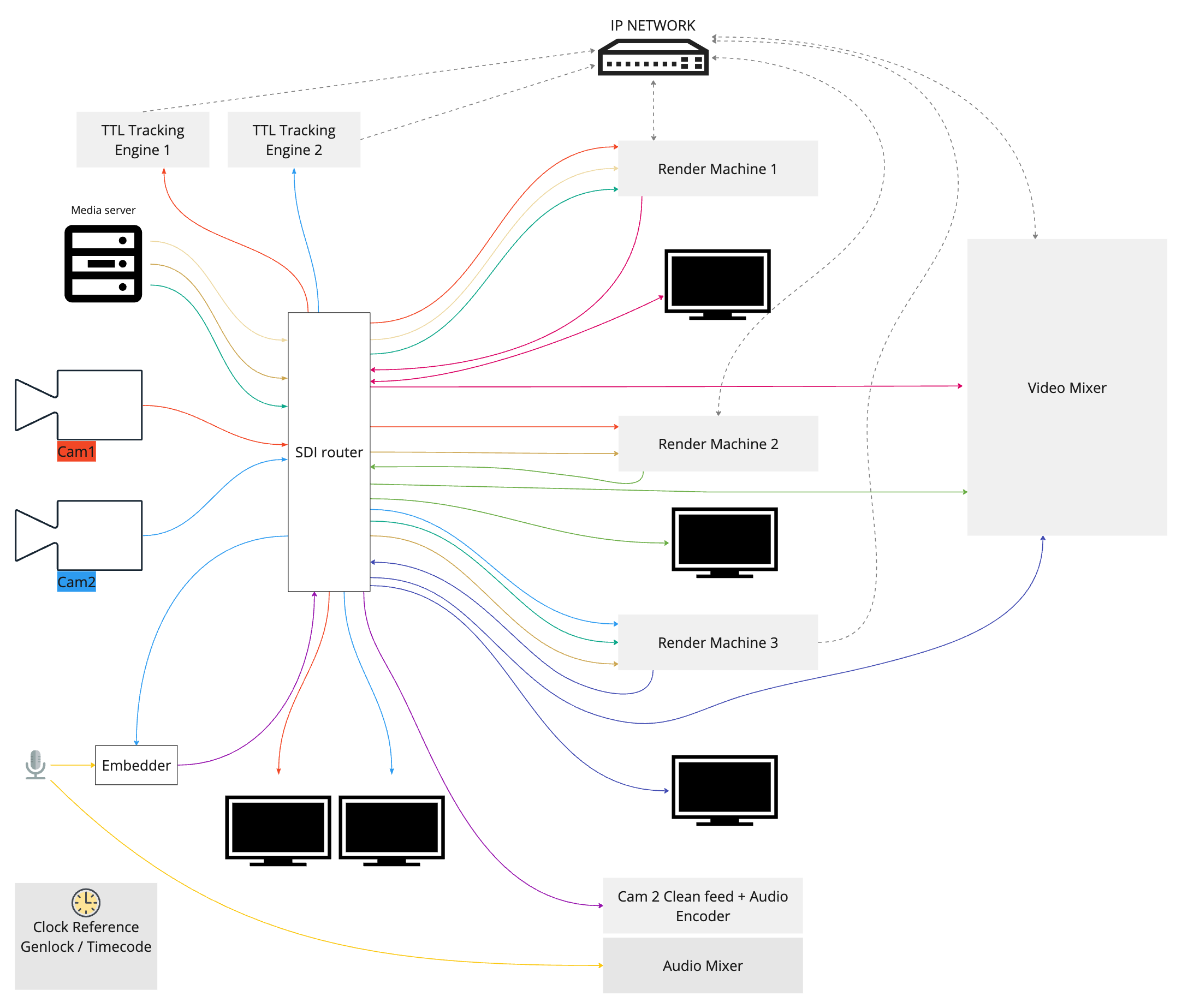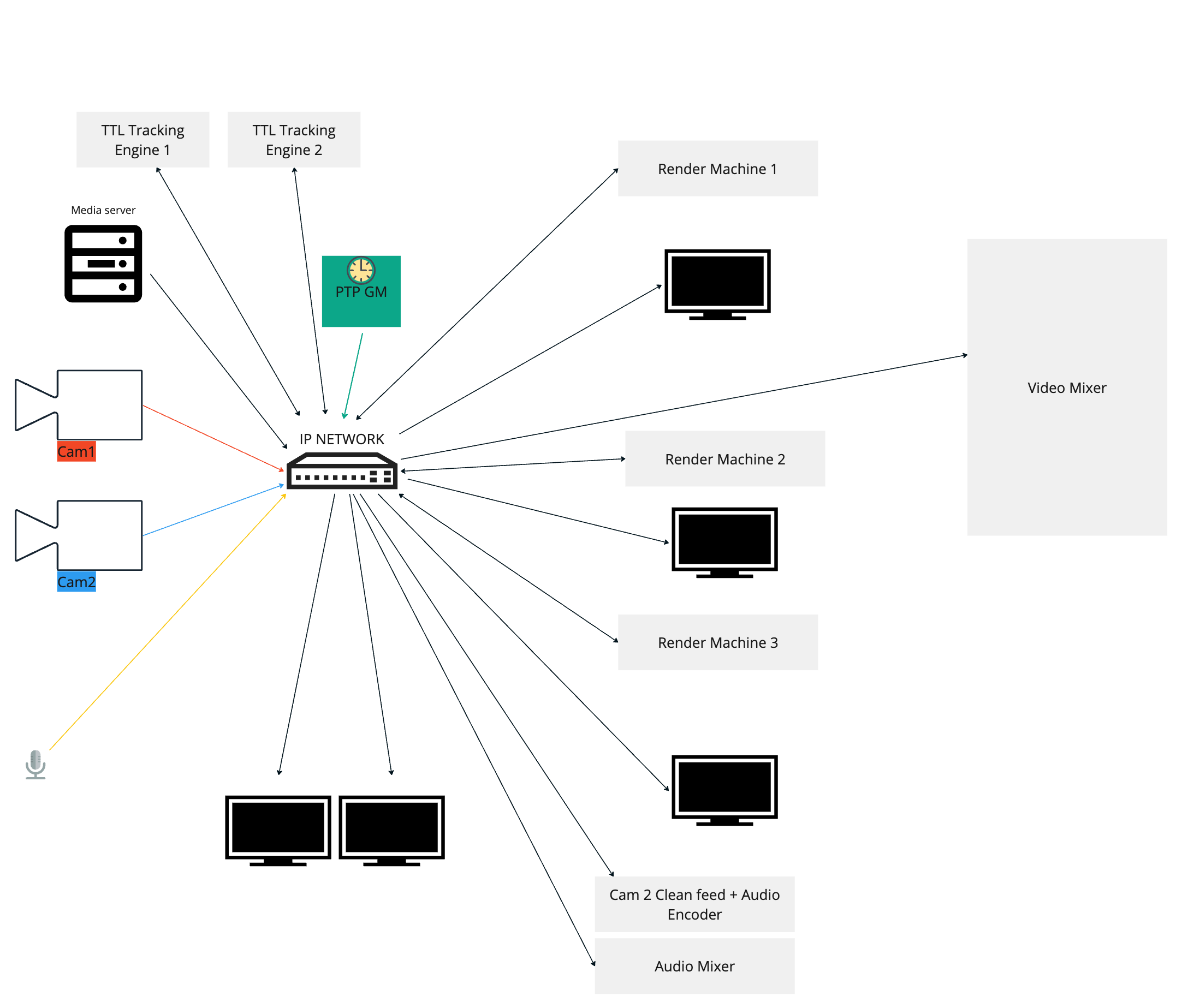SMPTE 2110 in Pixotope Graphics
Pixotope Graphics now supports SMPTE 2110 through integration with Matrox ST2110 network cards (DSX LE series), enabling seamless connectivity in IP-based production environments. This advancement marks a significant shift from traditional SDI infrastructure to more flexible, scalable IP workflows.
What is SMPTE 2110?
SMPTE 2110 is a suite of standards from the Society of Motion Picture and Television Engineers (SMPTE) for professional media transport over IP networks. Unlike SDI, which bundles video, audio, and ancillary data into a single signal, ST 2110 separates these elements into independent streams.
For complete documentation, please visit https://www.smpte.org/smpte-st-2110-faq
Supported ST 2110 and related standards
Standard | Spec | Description | Pixotope Support |
|---|---|---|---|
ST 2110 | 10 | Timing and Synchronization | ✓ |
20 | Uncompressed Video | ✓ | |
40 | Ancillary Data | Timecode only | |
NMOS1 | IS-04 | Discovery & Registration | ✓ |
IS-05 | Device Connection Management | ✓ | |
ST 20222 | 7 | Network redundancy | ✓ |
1. NMOS (Networked Media Open Specifications) is a family of open-source specifications produced by the Advanced Media Workflow Association (AMWA) that provides the essential control layer for interoperability between IP-based media devices from different manufacturers, acting as the "special sauce" that binds together ST 2110. NMOS enables seamless connection, management, and control of video and audio equipment in a vendor-agnostic environment.
For complete documentation, please visit https://specs.amwa.tv/nmos/
2. ST 2022-7, also known as "Seamless Protection Switching", is another SMPTE standard that enables the creation of redundant data streams for media transport over IP networks. This standard allows for seamless switching between these streams at the packet level, ensuring uninterrupted transmission even if one stream experiences losses or interruptions.
Benefits of Moving to ST 2110
Simplified Infrastructure: Replace complex SDI routing with standard IP network infrastructure
Format Flexibility: Support multiple formats and resolutions simultaneously
Resource Optimisation: Independent routing of video, audio, and data streams
Scalability: Easier expansion of production capabilities
Future-Proofing: Foundation for cloud-based and remote production workflows

Example of traditional SDI-based 2-camera virtual production (AR, VR or XR) studio

Same example as above, now implemented with uncompressed video over IP technology (SMPTE 2110)
New Requirements vs. Traditional SDI
Precision Timing Protocol (PTP): Essential for synchronisation across devices
Network Infrastructure: High-bandwidth, low-latency network switches
IP Knowledge: Team expertise in network configuration and management
Quality of Service (QoS): Proper network configuration for reliable performance
Implementation with Pixotope
Pixotope Graphics supports ST 2110 via Matrox ST2110 network cards (DSX LE series), enabling:
Seamless integration with existing IP infrastructure
Multiple input/output streams
Low-latency performance
Hardware-accelerated processing
Getting Started
Install and configure PTP (2110) in the network
Learn more about how to Configure Precision Time Protocol - PTP (2110)
Ensure network infrastructure meets ST 2110 requirements → See our recommended technology partners below
Configure Matrox cards in Pixotope
Learn more about how to Configure ST2110 - Matrox
Set up monitoring solutions (recommended) → See our recommended technology partners below
For detailed setup instructions and support, contact our technical team or refer to our comprehensive documentation.
Recommended Technology Partners
Network Infrastructure: Netgear
While Pixotope's ST 2110 implementation works with any compatible network switch, we recommend Netgear's purpose-built solutions:
Netgear M4350-16V4C & M4350-40X4C
Certified ST 2110 support
Simplified PTP configuration
Built-in QoS profiles for broadcast
Intuitive management interface
Monitoring Solutions: Bridge Technologies
For comprehensive IP workflow monitoring, we recommend:
Real-time ST 2110 stream analysis
PTP stability monitoring
Advanced visualization tools
Timing and network performance metrics
